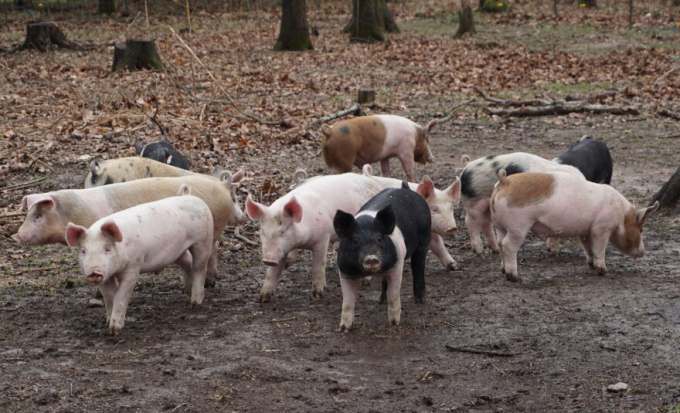June 19, 2025 | 01:29 GMT +7
June 19, 2025 | 01:29 GMT +7
Hotline: 0913.378.918
June 19, 2025 | 01:29 GMT +7
Hotline: 0913.378.918

Pigs roam about in an enclosure at DL Farms near Bland, Missouri, a small farming community about 30 miles north of Rolla. Photo: St. Louis Public Radio
so much so that they made the surprising move of reducing the amount of money they automatically give to the National Pork Checkoff, the industry’s fund for marketing, education and research, in hopes of having more money for lobbying and lawsuits.
Among the biggest issues is Proposition 12, a ballot initiative Californians passed in 2018 that sets animal production space requirements for any pork sold in the state. The law would have major ramifications for pork producers throughout the Midwest who operate concentrated animal feeding operations, more commonly called CAFOs.
While Proposition 12 has been caught up in the courts since it was passed and is scheduled to go to the U.S. Supreme Court, pork producers, especially large ones, are trying to repel such efforts.
“Rarely in the past did we rarely ever have a situation where you had an industry that was feeling like those from the outside were dictating how their industry should produce a product. And we’re seeing a lot more of that today,” said Scott Brown, an agricultural economist at the University of Missouri.
The National Pork Checkoff is a fund made up of a small percentage of every pound of pig sold in the U.S., but it can only be used for education, research and marketing. Lobbying efforts were expressly prohibited when the fund was set up 40 years ago, said Bill Even, CEO of the National Pork Board, which oversees the checkoff.
“Because different people may have different opinions on different legislative topics, that was an area that was excluded from our jurisdiction,” he said.
The National Pork Board did not comment on the proposal, as the organization stays neutral on such topics. “Ultimately, we work on behalf of the producers with the money they give us,” Even said.
In March, 94% of pork producers voted at the annual Pork Forum to reduce the guaranteed money that would go toward the checkoff. The hope was that pork producers would use the 12.5% decrease and instead voluntarily give that money to the Strategic Investment Program with the National Pork Producers Council, where it can be used for lobbying and legal efforts.
Some pork producers applaud the move, saying that drastic times call for drastic measures.
“This is the first time in the history of the world that we have to fight people to feed them,” said Scott Hays, a pig farmer who has 5,000 sows at his operation near Hannibal.
Hays said that he is frustrated by the laws and lawsuits that are challenging the way he raises his pigs and that fighting back against what he calls "ridiculous rules" should be the industry’s top priority.
“That’s where we need producer money to be spent, to guard what we do so we can continue to provide a safe, wholesome product for consumers,” he said.
Hays said he will take the money he saves from the Pork Checkoff fees and voluntarily give it to the lobbying wing of pork producers.
Not all pork is produced in CAFOs, and not all pig farmers are planning to voluntarily give money to lobbyists and lawyers.
Dave Busby raises pigs, chickens, turkeys and cows on his 500-acre farm near Bland, Missouri. He raises about two dozen pigs a year and only during warm weather months.
Even though his pigs end up as bacon, pork chops and ham, he strives to give them a certain quality of life.
“I’ll get in here and sit with them for a while and they’ll come up and talk,” Busby said. “I can’t imagine, if you were a pig, where would you have what they have here? Especially when I open it up and they get to roam a whole lot more. You get to see sides of them that you wouldn’t see at all in a CAFO.”
Busby said too much of agriculture is focused on protecting large producers and big companies. And he’s not interested in giving any money to help them.
“I don’t want to benefit Smithfield. I don’t need to benefit Cargill, these giant producers. They don’t need me,” he said. “They need me to buy their product, but they don’t need me.”
But to put things in perspective, it would take more than 250 Dave Busbys to equal the pork production and monetary power of one Scott Hays. There aren’t many small producers, and the large ones who want more money for lobbying could make it a well-funded endeavor.
(Poultryworld)

(VAN) Extensive licensing requirements raise concerns about intellectual property theft.

(VAN) As of Friday, a salmonella outbreak linked to a California egg producer had sickened at least 79 people. Of the infected people, 21 hospitalizations were reported, U.S. health officials said.

(VAN) With the war ongoing, many Ukrainian farmers and rural farming families face limited access to their land due to mines and lack the financial resources to purchase needed agricultural inputs.

(VAN) Vikas Rambal has quietly built a $5 billion business empire in manufacturing, property and solar, and catapulted onto the Rich List.

(VAN) Available cropland now at less than five percent, according to latest geospatial assessment from FAO and UNOSAT.

(VAN) Alt Carbon has raised $12 million in a seed round as it plans to scale its carbon dioxide removal work in the South Asian nation.

(VAN) Attempts to bring down the price of the Japanese staple have had little effect amid a cost-of-living crisis.